Marcia Thornton Jones's Blog, page 101
April 14, 2019
Forgiveness and Writing
This month on the blog we're sharing words of encouragement to beginning writers. Here is one of the most inspiring sentiments I've ever read, by author Ann Patchett, excerpted from her essay, The Getaway Car:
"Stop here for a few breaths and think about this, because it is the key to making art and very possibly the key to finding any semblance of happiness in life.
"Every time I have set out to translate the book (or story, or hopelessly long essay) that exists in such brilliant detail on the big screen of my limbic system onto a piece of paper (which, let's face it, was once a towering tree crowned with leaves and a home to birds), I grieve for my own lack of talent and intelligence. Every. Single. Time.
"Were I smarter, more gifted, I could pin down a closer facsimile of the wonders I see. I believe that, more than anything else, this grief of constantly having to face down our own inadequacies is what keeps people from being writers.
"Forgiveness, therefore, is key. I can't write the book I want to write, but I can and will write the book I am capable of writing. Again and again throughout the course of my life I will forgive myself."
 I absolutely love that quote and remind myself often of Patchett's words. Excellent advice for a beginning writer, and every writer.
I absolutely love that quote and remind myself often of Patchett's words. Excellent advice for a beginning writer, and every writer.
Michele Weber Hurwitz is the author of four middle grade novels, from Penguin Random House and Simon & Schuster. Her fifth novel publishes in May 2020. Find her online at micheleweberhurwitz.com.
"Stop here for a few breaths and think about this, because it is the key to making art and very possibly the key to finding any semblance of happiness in life.
"Every time I have set out to translate the book (or story, or hopelessly long essay) that exists in such brilliant detail on the big screen of my limbic system onto a piece of paper (which, let's face it, was once a towering tree crowned with leaves and a home to birds), I grieve for my own lack of talent and intelligence. Every. Single. Time.
"Were I smarter, more gifted, I could pin down a closer facsimile of the wonders I see. I believe that, more than anything else, this grief of constantly having to face down our own inadequacies is what keeps people from being writers.
"Forgiveness, therefore, is key. I can't write the book I want to write, but I can and will write the book I am capable of writing. Again and again throughout the course of my life I will forgive myself."
 I absolutely love that quote and remind myself often of Patchett's words. Excellent advice for a beginning writer, and every writer.
I absolutely love that quote and remind myself often of Patchett's words. Excellent advice for a beginning writer, and every writer.Michele Weber Hurwitz is the author of four middle grade novels, from Penguin Random House and Simon & Schuster. Her fifth novel publishes in May 2020. Find her online at micheleweberhurwitz.com.
Published on April 14, 2019 05:00
April 11, 2019
One Word of Advice
Dear Burgeoning Author,
 I know, I know. You want all the advice, and you want it now. You’ve heard the most basic piece: READ, READ, READ; WRITE, WRITE, WRITE. And you’ve been doing that.
I know, I know. You want all the advice, and you want it now. You’ve heard the most basic piece: READ, READ, READ; WRITE, WRITE, WRITE. And you’ve been doing that.
“But PLEASE," you say, nearly panting. “Enlighten me further. Tell me everything!”
How about I start with one thing, one word, which may sound so basic but few people heed.
FINISH!It’s so easy to glom onto a bright, shiny idea and swoon over it for weeks. It easy to name your characters, give them interesting traits, put them in the midst of extraordinary situations. Then you reach the middle.
There’s a reason it’s been dubbed murky. You’ve brilliantly laid out the start of your yellow brick road. You have a solid idea for a satisfying conclusion. Maybe you even have that middle all plotted out. But the thing is, traveling from here to there can feel so boring. Yes, I said it. The writing process can be boring. That’s when danger happens.
A newer, brighter, shinier idea comes along. You wonder: How could I ever think that old, tired, idiotic idea was a stroke of genius? Then you get all moony over your new baby. You want to cradle it and rock it and spend your days with it. But resist. Otherwise, you’ll get stuck in a never-ending loop of half-finished projects.

When you tough it out, the rewards might not be immediate, but they’ll run deeper than you can imagine. Not only will you feel a sense of accomplishment and have a book that might be highly marketable, you’ll also learn so much more about the writing process—your personal process and writing in general—that you’ll be able to out-blog me on this topic.
Finish.
The End.
Your friend,
Jody Feldman
 I know, I know. You want all the advice, and you want it now. You’ve heard the most basic piece: READ, READ, READ; WRITE, WRITE, WRITE. And you’ve been doing that.
I know, I know. You want all the advice, and you want it now. You’ve heard the most basic piece: READ, READ, READ; WRITE, WRITE, WRITE. And you’ve been doing that.“But PLEASE," you say, nearly panting. “Enlighten me further. Tell me everything!”
How about I start with one thing, one word, which may sound so basic but few people heed.
FINISH!It’s so easy to glom onto a bright, shiny idea and swoon over it for weeks. It easy to name your characters, give them interesting traits, put them in the midst of extraordinary situations. Then you reach the middle.
There’s a reason it’s been dubbed murky. You’ve brilliantly laid out the start of your yellow brick road. You have a solid idea for a satisfying conclusion. Maybe you even have that middle all plotted out. But the thing is, traveling from here to there can feel so boring. Yes, I said it. The writing process can be boring. That’s when danger happens.
A newer, brighter, shinier idea comes along. You wonder: How could I ever think that old, tired, idiotic idea was a stroke of genius? Then you get all moony over your new baby. You want to cradle it and rock it and spend your days with it. But resist. Otherwise, you’ll get stuck in a never-ending loop of half-finished projects.

When you tough it out, the rewards might not be immediate, but they’ll run deeper than you can imagine. Not only will you feel a sense of accomplishment and have a book that might be highly marketable, you’ll also learn so much more about the writing process—your personal process and writing in general—that you’ll be able to out-blog me on this topic.
Finish.
The End.
Your friend,
Jody Feldman
Published on April 11, 2019 04:00
April 8, 2019
INTERVIEW WITH ANGIE SMIBERT, AUTHOR OF LINGERING ECHOES
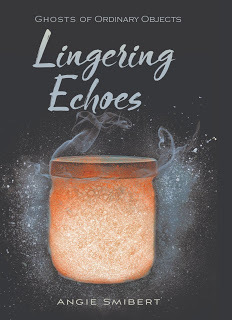 We're lucky to be joined today by Angie Smibert, whose LINGERING ECHOES (book #2 in the GHOSTS OF ORDINARY OBJECTS) just released with Boyds Mills Press!
We're lucky to be joined today by Angie Smibert, whose LINGERING ECHOES (book #2 in the GHOSTS OF ORDINARY OBJECTS) just released with Boyds Mills Press!
Tell us all about the GHOSTS OF ORDINARY OBJECTS SERIES.
Set in 1942 in a small coal mining community in Southwest Virginia, the series is a blend of history, mystery, and a bit of magic/supernatural. Bone Phillips (12) discovers she’s coming into a family “Gift” as her grandmother calls it. With a touch, Bone can see the stories (or ghosts) in ordinary objects—and she doesn’t like it one bit. She loves stories but ones with princesses and gypsies and ghosts--not stories that are true. In each book, Bone explores her Gift and solves a mystery surrounding a particular object.
This is book #2 in the series. What were the challenges of writing book #2? How did you make it accessible to readers who might not have read book #1? What steps did you take to make it feel like a complete read, even though another book follows?
The tricky part is introducing characters and backstory from Book 1 without weighing down the beginning of Book 2. Lingering Echoes actually picks up not too much after Bone’s Gift, so I used a prologue to tie the two together.
To make them complete reads, each book in the series has a distinct plot and character arc. Through each, though, Bone is growing in her ability to use her Gift—and her rocky relationship with her aunt Mattie is a thread that runs through the series.
Where did the idea for Bones's gift come from?
Bone is a natural storyteller. She loves folktales, ghost stories, books, movies, and so forth—any story that isn’t real. She’s had a bit too much realness in her life. So, of course, I had to give her a Gift having to do with the stories of real people, ones who’ve left imprints on objects.
The idea for the particular gift came from some research into “psychic” talents, one of which is called psychometry. People who have this gift claim to be able to touch objects and see the past lives of that object or the people who owned them. Before I wrote the first book, though, I didn’t think this gift was something found in Appalachia—but I’ve since learned differently. After a couple of talks, I’ve had people tell me they have Bone’s gift.
Why did you choose this setting--the physical location and the historical setting?
Actually, I started with the place. Big Vein—the community in the books—is loosely based on McCoy, Virginia. It’s where my mother’s side of the family had lived for generations, going back to the 1790s. My grandfather and his brother were miners in a real mine called Big Vein, and my great-grandfather ran the store next to the mine. The mines in the New River Valley area stopped operating in the 1950s, so there’s really nothing left of the mines except the memories.
What challenges did you encounter writing a historical book for young readers?
With any historical book, one challenge is to paint a picture of time period the reader isn’t familiar with—without overdoing the exposition. Too little, and the reader doesn’t get what’s going on. Too much, and the reader might not care!
The other big challenge is to get many young readers to read historical books in the first place. I’ve had this conversation with several teachers and librarians. Since my series also has mystery and fantasy/magical realism elements, this makes the history more fun to read.
How much research did you have to do before you started writing?
Quite a bit! Luckily, though, I love research. Plus I already had a lot of the source material because it was also family history. A local church had put together a collection of family histories, stories, pictures, and so forth that was really helpful. And a local university had collected oral histories from miners in the area—and one of the miners was my grandfather’s youngest brother. I also researched Appalachian folktales and the history of their collection—as well as just about everything else having to do with both the time period and region.
How has your own childhood influenced your writing?
The idea for Ghosts of Ordinary Objects grew from a sense memory from childhood. I was living in Florida at the time. One lazy afternoon at the beach near my house, I was swimming (ok, floating along) in the water and had this sense memory of doing the same thing in the New River as a kid. I remembered that feeling of being the 12 year old tomboy, floating in the water up to my eyeballs, warm yellow sun on my face, the crickets and cicadas humming, as a coal train rattled by. It was the feeling of summer and not wanting it end. It was also the feeling of not wanting things to change, to stay in that perfect moment, yet not be left behind as others grew up and moved on.
A younger me also had a head full of stories. Do you remember the first you actually wrote down? How old were you?
I did have stories in my head all the time as a kid. I’d mash up a little from a TV show I liked with a book or movie and created my own little universe. However, I didn’t really think about writing them down until I was an adult. In high school and the beginning part of college, I was so set on becoming a veterinarian that I didn’t even consider writing as an option—even though I had an English professor tell me I should be an English major.
How does teaching influence your writing?
Teaching—and particularly giving feedback to other writers—helps me hone in things I need to work on in my own writing. And when you’re trying to explain something to a student, that concept tends to crystallize in your head and make you more cognizant to applying to your own work.
A goofy dog and two bickering cats must mean your home is full of a devilish sense of humor! How do you feel a life with animals impacts your writing?
I’m now up to three bickering cats! Truthfully, they get along with each other and the dog. Most of the time. And most of the time, they’re not a distraction. (…although my newest cat does like to photobomb Skype sessions!) For ~97% of my life, I’ve had dogs and/or cats, so it’s hard to imagine not having them in my life or them not impacting my writing. ;)
LINGERING ECHOES ends on quite the cliffhanger. ("The crowd gasped.") What can we look forward to in THE TRUCE?
As we speak, I should be working on the revisions to The Truce. It happens around Christmas 1942 and involves a body in the mine, some dog tags, Uncle Ash, and a ghost dog.
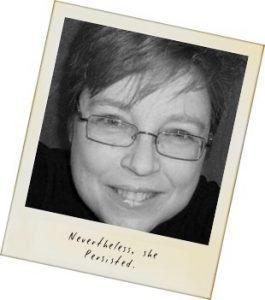 Where can we find you online?
Where can we find you online?Website: www.angiesmibert.comTwitter: @amsmibertFacebook: www.facebook.com/AngieSmibertAuthor/I... www.instagram.com/asmibert/
Oh, I’m also a member of Spooky Middle Grade: spookymiddlegrade.com
Published on April 08, 2019 23:00
A Writing Legacy -- by Jane Kelley
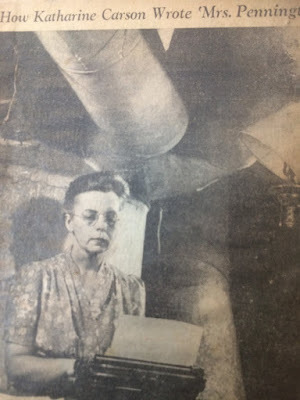 My grandmother, Katharine Carson, wrote in the basement. Prior to the publication of her fourth novel, she was photographed behind her typewriter, underneath some ominous air ducts. Her hair is pinned up in a utilitarian style. Her dress is plain. Her smile is non-existent.Ah, the glamorous life of an author. And yet I imagine that the basement was her refuge. Upstairs, the house was full of relatives: a demanding mother-in-law, an alcoholic brother-in-law, two quarreling daughters, and an authoritarian husband. Downstairs, two piles of paper—one whose pages crowded with her words and one whose pages were blank with infinite possibilities.
My grandmother, Katharine Carson, wrote in the basement. Prior to the publication of her fourth novel, she was photographed behind her typewriter, underneath some ominous air ducts. Her hair is pinned up in a utilitarian style. Her dress is plain. Her smile is non-existent.Ah, the glamorous life of an author. And yet I imagine that the basement was her refuge. Upstairs, the house was full of relatives: a demanding mother-in-law, an alcoholic brother-in-law, two quarreling daughters, and an authoritarian husband. Downstairs, two piles of paper—one whose pages crowded with her words and one whose pages were blank with infinite possibilities.
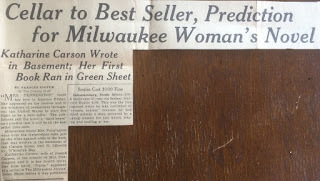 From cellar to best seller was not to be. According to family lore, the onset of World War II drowned out the story of Mrs. Pennington, a woman whose wise counsel holds her family together in the late 19th century. My grandmother’s fame was fleeting. None of her five novels are still in print.
From cellar to best seller was not to be. According to family lore, the onset of World War II drowned out the story of Mrs. Pennington, a woman whose wise counsel holds her family together in the late 19th century. My grandmother’s fame was fleeting. None of her five novels are still in print. I read them avidly, enjoying her clever wit, her succinct characterizations, and her depictions of people I knew were based on my ancestors. She died when I was six. I doubt she had any idea that I would, after many detours, follow in her footsteps and become a published author. If she had known, I wonder what she would have told me. I think her advice about writing might have resembled the advice she gave my mother who couldn’t get me to eat a decent breakfast. "Put an extra egg in the pancakes."
In other words, cook something delicious, but make sure it’s nutritious.
And as her photograph shows, it doesn't matter where you write––just that you do.
Published on April 08, 2019 07:18
April 3, 2019
Interview with Lamar Giles, Author of THE LAST LAST-DAY-OF-SUMMER
 HS: Give us the elevator pitch for THE LAST LAST-DAY-OF-SUMMER:
HS: Give us the elevator pitch for THE LAST LAST-DAY-OF-SUMMER:
LG:THE LAST LAST-DAY-OF-SUMMER stars The Legendary Alston Boys of the supernaturally weird Logan County, Virginia. There’s Otto, a loving know-it-all, and Sheed, who’s sometimes cranky, but always cool. When they’re tricked into freezing time on the last day of summer by the mysterious Mr. Flux, they unleash a bunch of weird creatures they either have to align with, or battle, to save the day. It’s like the Hardy Boys crashed into The Phantom Tollbooth.
HS: This book was so much fun—a mix of superheroes and adventure. As a kid of the ‘80s, I could really get a Back to the Future vibe. What were your writing or storytelling influences for this one?
LG:Well, you hit the nail on the head calling out Back to the Future. That film is easily in my top 3 most influential stories, and the book is littered with references to it. Also, any time travel or time-related stories I enjoyed in addition to BTTF I tried to drop a reference for it. There’s something in there for fans of Dr. Who to Octavia Butler’s Kindred. But the primary influence for how this story came to be is Star Wars Episode IV: A New Hope. I’ve loved that movie for as long as I can remember, and I was always struck by how George Lucas dropped us into a world/war that was already in motion, without a need to explain what had gone on before (until we got the prequels many years later). I liked the idea of Otto and Sheed being Weirdness Veterans when we’re introduced to them, and that all started in a galaxy far, far away.
HS: The We Need Diverse Books movement has started so many discussions in the industry. As you travel to promote LAST DAY, are you finding discussions with young readers are different than discussions with adults? How so?
LG: Yes, the conversations are very different. I find that young people are generally excited about the possibility of different kinds of people in different kinds of (good) stories. They tend to be more open to variety in their stories. Adults, by and large, are open to variety, too…but there seems to be much more anxiety about it. What’s the right way to do it? Who can tell the story? And if the adult has an aspiration to write, the anxiety doubles. It’s interesting and justified given how much attention botched diverse stories get; and I’m up for any conversation on the topic. But I’d say rigidity is another symptom of age and time passing…we adults don’t have the flexibility of our young counterparts.
HS: I love how you play with time in this book: freezing time, also, the appearances of Father Time, Time Suck, Clock Waters, AM / PM, Witching Hour, etc. Do you feel that time passes differently for young readers than it does for adults? (I’m thinking here how adults seem to want to freeze time, and kids seem to want to make it hurry up—kind of like Tom Hanks in Big, another ‘80s movie I caught myself thinking of as I read.)
LG:I absolutely believe time passes differently for young people than adults. The older you get, the faster it moves. Which drives innate desires to alter it somehow. As a child you want it to speed up because it feels painfully slow—except when you’re having fun. That drives Otto’s desire to keep that last day of summer as long as possible. He thinks he’s at his best in those fun summer adventures, not realizing that prolonging his pleasure is to also court pain. Pain for the residents, and pain for himself as he realizes that time must go on, and there are certain unpleasant inevitability that comes with it. But, there’s joy too. That’s what life is right? Ups, downs, and how we choose to deal with them.
HS: I also love the idea that the person who controls time has great power. What do you want young readers to be thinking about regarding power?
LG: Power should be handled responsibly, and of our two heroes, I think it’s a notion that Otto struggles with more than Sheed.Otto looks to control things, extending what’s pleasant, and trying to undo what’s not. Certainly, there’s something to be said about being proactive to make situations better, but at what cost? So, what I’d love young readers to think about it is if it’s worth getting all you want if it means other people will be hurt?
HS: This book includes so many imaginative turns and events and creatures, etc. But it’s also got almost a low-tech feel (for example: the Polaroid camera). What’s your take on how tech is impacting the imagination?
LG: I think tech, in any era, compliments imagination. Example: the way the show Black Mirror on Netflix has tried to implement the elements of a Choose Your Own Adventure novel in a streaming movie. The results are mixed, I think, but someone’s going to build on that tech and the story to either create something better, or new. I believe that will be the case with all sort of emerging tech, be it augmented reality, virtual reality, or whatever comes next (I’m thinking holodecks—shout out to my Star Trek fans!)
HS: You write such great action scenes. Do you have tips for writing action?
LG:Yes! Cut, cut, cut. Shorter is better. Shorter scenes, shorter sentences, shorter words. You need to vary how you use this of course, but I’ve found that writing action scenes is akin to Vin Diesel in the Fast and Furious films stripping the extra weight from a car before a race. The less you have to carry, the swifter the vehicle becomes.
HS: What was your writing process like overall? Are you an outliner?
LG:I’ll write a synopsis, this three to five page thing that lays out some version of the story, and then I’ll write the story and end up changing maybe 50% of what the synopsis said. So, that’s not outlining. I don’t know what that is. Messy? Sounds about right. LOL!
HS: What overall message do you hope readers will take away from this book?
LG:Essentially, I’ve written an elongated version of the phrase “enjoy the time you have.”
HS: What’s next for you?
LG:I’m working on a coming of age story called Not So Pure and Simple, about a young man who joins the Purity Pledge at his church because he likes a girl who’s in it. At the same time, he starts sex education at the local high school. As the only member of the purity pledge even allowed to take the course, he becomes a go-between finding answers for the sheltered church kids, and causes a bit of a stir in his town.
~Thanks so much to Lamar Giles for such a thoughtful interview! Snag yourself a copy of LAST LAST-DAY-OF-SUMMER and keep up with Lamar here.
Published on April 03, 2019 23:00
Letter of Encouragement to a Young Writer
Dear Young Writer,
Wow, I love what you're doing with all those words and characters and plots! I can tell you really love it. And I want you to know that I love it too – I especially love all the ways you're sharing yourself with the world, and the way you're making this a priority in your life.
You may not believe it, but truly I can see how it's changing you, and it's also changing me. Thank you!
Whenever you get discouraged please remember I'm right here, eager to read your words and honored to get a glimpse of your big heart. And I'm not the only one! The reader who needs you most is out there, waiting.
So KEEP GOING! It's important and worthwhile and generous, and I'm rooting for you all the way.
Love,Irene----------Irene Latham lives on a lake in rural Alabama. Winner of the 2016 ILA Lee Bennett Hopkins Promising Poet Award, she is the author of hundreds of poems and nearly twenty current and forthcoming poetry, fiction and picture books from publishers including Penguin Random House, Macmillan, Lerner, Boyds Mills, and Charlesbridge. Her books have been recognized on state lists and honored by NEA, ALA, NCTE, SIBA, Bank Street College and other organizations.
Published on April 03, 2019 03:30
March 28, 2019
A Thoroughly Enjoyable Distraction
Oh, so many things I could write about as distractions from writing! Yesterday it was a lousy night's sleep the night before; the day before that, it was doctor and dentist appointments (mine and my kids'). But over spring break, I CHOSE a distraction, and I enjoyed every minute of it.
When Publishers Weekly announced in its deal memo that Laurie Boyle Crompton had just inked a contract for a book that was a combination of 80s movies Groundhog Day and Pretty in Pink, I began the countdown until the book would hit stands. Finally, with the kids out of school for a full week (read: no lessons to drive them to, etc.), I was able to dig in.
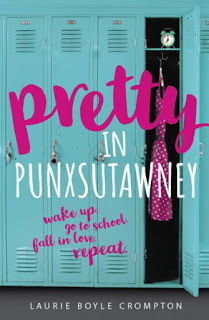
This wholesome novel (seriously, you could hand it to your 12-year-old and not worry about profanity or sexual situations you'd rather not discuss yet) is every bit as fun as an 80s movie classic. And as someone who grew up on those movies, it was fun to see that Crompton incorporated not only the two mentioned in the "elevator pitch" summary, but also touched on just about every other classic 80s movie as well. I liked the way that her protagonist, Andie (named after Molly Ringwald's character in Pretty in Pink, natch), cast a critical eye on the problematic aspects of the films while also appreciating them for what they were. (For example, it's crazy to think that we all watched Sixteen Candles without being alarmed by the suggestion that sexual assault is A-OK if your girlfriend is shallow, mean, and too drunk to know what's happening...what was wrong with society back then!?) I also loved that Andie's supposed rival is a gorgeous brunette named Kaia. I wondered if Crompton chose to name her after the daughter of Cindy Crawford, the official goddess of the 80s. (Cindy's daughter is basically her mom 2.0--drop-dead gorgeous as well.)
So, over spring break, I didn't write very much, but it was time well spent. And as an added bonus, I feel that the break from work opened up my creativity for the coming weeks.
Sometimes, it's great to be distracted.
When Publishers Weekly announced in its deal memo that Laurie Boyle Crompton had just inked a contract for a book that was a combination of 80s movies Groundhog Day and Pretty in Pink, I began the countdown until the book would hit stands. Finally, with the kids out of school for a full week (read: no lessons to drive them to, etc.), I was able to dig in.

This wholesome novel (seriously, you could hand it to your 12-year-old and not worry about profanity or sexual situations you'd rather not discuss yet) is every bit as fun as an 80s movie classic. And as someone who grew up on those movies, it was fun to see that Crompton incorporated not only the two mentioned in the "elevator pitch" summary, but also touched on just about every other classic 80s movie as well. I liked the way that her protagonist, Andie (named after Molly Ringwald's character in Pretty in Pink, natch), cast a critical eye on the problematic aspects of the films while also appreciating them for what they were. (For example, it's crazy to think that we all watched Sixteen Candles without being alarmed by the suggestion that sexual assault is A-OK if your girlfriend is shallow, mean, and too drunk to know what's happening...what was wrong with society back then!?) I also loved that Andie's supposed rival is a gorgeous brunette named Kaia. I wondered if Crompton chose to name her after the daughter of Cindy Crawford, the official goddess of the 80s. (Cindy's daughter is basically her mom 2.0--drop-dead gorgeous as well.)
So, over spring break, I didn't write very much, but it was time well spent. And as an added bonus, I feel that the break from work opened up my creativity for the coming weeks.
Sometimes, it's great to be distracted.
Published on March 28, 2019 07:11
March 24, 2019
DISTRACTIONS SHMACKTIONS (HOLLY SCHINDLER)
We consistently label distractions as bad. And yeah, they can suck some precious time away from our writing projects.
But as far as I’m concerned, many of those distractions can actually be productive—and the source of a wealth of information.
I do keep several news feeds open as I write, as well as some social media feeds. I write until I begin to lose steam, then click over to read a few articles or check out what’s being discussed in an online writers’ group. I check out what illustrators are posting. I bounce around until I get that itch to get back to my WIP. I move that way throughout the day, back and forth, writing and reading, writing and reading.
The thing is, I've learned you’ve always got to keep your antenna out. I think that means reading PW and talking to other writers, subscribing to as many trade newsletters and magazines as possible. You don’t know what you don’t know. Which means you can’t Google it in a post-writing opportune time. You have to just be out there, constantly interacting, reading, listening. That’s how I’ve been learning about the publishing industry all along—both traditional and indie publishing.
You can’t write in a vacuum. That means you need an editor and feedback on your work, sure. But I think that also means you can’t simply write and not attempt to learn about the industry as a whole. That’s where we’re lucky. Living in a world in which everything is online, we get a chance to talk to bookstore owners and librarians. We get to talk to teachers and see how our work is being used in the classroom. We get to hear what kind of books readers are hungry for. And we get to see in real time what’s going on in the publishing industry itself.
That’s not to say we should all be writing to market. Chasing trends. Racing to get on the next bandwagon. But all this information really can help inform and shape your own WIP, the work of your heart. Or it can help shape the submission or marketing or packaging of that work. It’s really nice, once you get done writing, to already have a plan for what to do next—a plan that’s been shaped by all your reading during “distraction” time!
Published on March 24, 2019 23:00
March 22, 2019
What is the Moon of Your Imagination? Smack Dab in the Imagination by Dia Calhoun
The third super moon of the year fell on the equinox--what could be better? The name. Worm Moon--that's the name of the full moon of March. Really? All the amazing things about spring and Worm Moon is the best we can do? (no offense to worms or their importance intended...)
Where I live, the frogs singing on the river are one of the first heralds of spring. So I am renaming the March full moon, Frog Moon. I like the idea of connecting cosmic events to my own geographical location. So I plan to use my imagination to create my own names for each month's full moon.
What an intriguing imaginative assignment this would be for kids. Ask students to create their own names for each month's full moon, based on what they do in that month or on where they live. (I can hear your warning ....Screen Moon will be the most popular choice . . .) Have the students add a sentence or two about why they chose each name. Then have them choose their favorite moon as short story or poem prompt.
I am working on my list. So far:
September: Golden Corn Moon.
June: Shawn's Strawberry Moon.
October: Last Chance to Dance Moon (before winter.)
January: Quiet Moon
February: Endless Winter Moon
I'll keep you posted.
Where I live, the frogs singing on the river are one of the first heralds of spring. So I am renaming the March full moon, Frog Moon. I like the idea of connecting cosmic events to my own geographical location. So I plan to use my imagination to create my own names for each month's full moon.
What an intriguing imaginative assignment this would be for kids. Ask students to create their own names for each month's full moon, based on what they do in that month or on where they live. (I can hear your warning ....Screen Moon will be the most popular choice . . .) Have the students add a sentence or two about why they chose each name. Then have them choose their favorite moon as short story or poem prompt.
I am working on my list. So far:
September: Golden Corn Moon.
June: Shawn's Strawberry Moon.
October: Last Chance to Dance Moon (before winter.)
January: Quiet Moon
February: Endless Winter Moon
I'll keep you posted.
Published on March 22, 2019 22:28
March 20, 2019
My Biggest Distraction
DISTRACTION. What a great topic for authors! I wish I could blame it on someone else. But unfortunately, I have no one to blame my distractions on but ME!
Yes, I have to take 100% responsibility for this one because:
Who flips through news headlines when she sits down at her computer instead of opening the Word File she's working on?Who clicks on some of those headlines to follow the "rabbit hole" of reading that beckons from beyond?Who answers her email instead of getting right to her current work-in-progress?Who scrolls through Twitter letting the latest controversy take up prime real estate in her mind?Who decides she's hungry and goes to the kitchen for a snack even though she just ate lunch?Who lets the dog coerce her for one more time outside, before she gets to her work?Who cleans and organizes desk drawers when her manuscript sits waiting?
Obviously I could go on and on, but it doesn't matter how many more questions I pose because the answer to all of them is ME. To anyone trying to accomplish their work for the day, distractions like these are a real threat to productivity and to completing long-term projects. But, that said, because all the distractions stem from the same thing, the solution to all of them is the same as well. Just as I'm responsible for giving in to all these things that have the potential to distract me, I also have the opportunity to decide to be disciplined instead of distracted.
I've come to realize over the years that distractions will always be there. Noticing them, naming what they are, and finding a way to keep them at bay is my strategy for getting my work finished. So, when I find myself on the wrong side of the things that take me from my work, I pay attention to what those things are, and then I find a way to keep myself on the right side of them. For example, I don't let myself scroll through news headlines until my work is finished. I keep my phone off my desk to curb the temptation of Twitter. I reward myself with that snack once I'm ready to put aside my writing for the day.
Most of all I remember, that, if I'm the only one to blame for my distractions, then I'm the only one who is able to do anything about them.
Happy Distraction-free Reading & Writing,
Nancy
Yes, I have to take 100% responsibility for this one because:
Who flips through news headlines when she sits down at her computer instead of opening the Word File she's working on?Who clicks on some of those headlines to follow the "rabbit hole" of reading that beckons from beyond?Who answers her email instead of getting right to her current work-in-progress?Who scrolls through Twitter letting the latest controversy take up prime real estate in her mind?Who decides she's hungry and goes to the kitchen for a snack even though she just ate lunch?Who lets the dog coerce her for one more time outside, before she gets to her work?Who cleans and organizes desk drawers when her manuscript sits waiting?
Obviously I could go on and on, but it doesn't matter how many more questions I pose because the answer to all of them is ME. To anyone trying to accomplish their work for the day, distractions like these are a real threat to productivity and to completing long-term projects. But, that said, because all the distractions stem from the same thing, the solution to all of them is the same as well. Just as I'm responsible for giving in to all these things that have the potential to distract me, I also have the opportunity to decide to be disciplined instead of distracted.
I've come to realize over the years that distractions will always be there. Noticing them, naming what they are, and finding a way to keep them at bay is my strategy for getting my work finished. So, when I find myself on the wrong side of the things that take me from my work, I pay attention to what those things are, and then I find a way to keep myself on the right side of them. For example, I don't let myself scroll through news headlines until my work is finished. I keep my phone off my desk to curb the temptation of Twitter. I reward myself with that snack once I'm ready to put aside my writing for the day.
Most of all I remember, that, if I'm the only one to blame for my distractions, then I'm the only one who is able to do anything about them.
Happy Distraction-free Reading & Writing,
Nancy
Published on March 20, 2019 04:30



